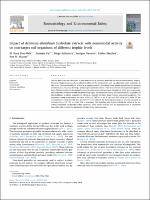Please use this identifier to cite or link to this item:
https://repositorio.usj.es/handle/123456789/1075
| Title: | Impact of Artemisia absinthium hydrolate extracts with nematicidal activity on non-target soil organisms of different trophic levels |
| Authors: | Pino Otín, Rosa


Val, Jonatan 


Ballestero Fernández, Diego Navarro, Enrique 


Sanchez, Esther 
Mainar, Ana M. 


|
| Keywords: | Biopesticide; Acute toxicity; Artemisia absinthium; Soil organisms |
| Issue Date: | Sep-2019 |
| Publisher: | Elsevier |
| Citation: | M. Rosa Pino-Otín, Jonatan Val, Diego Ballestero, Enrique Navarro, Esther Sánchez, Ana M. Mainar, Impact of Artemisia absinthium hydrolate extracts with nematicidal activity on non-target soil organisms of different trophic levels, Ecotoxicology and Environmental Safety,Volume 180,2019,Pages 565-574,ISSN 0147-6513,https://doi.org/10.1016/j.ecoenv.2019.05.055. |
| Abstract: | Natural pesticides are considered a good alternative to synthetic pesticides to reduce environmental impacts. However, biopesticides may have unknown effects on the environment, and can affect non-target organisms. In this study, the ecotoxicological effects of an aqueous extract (hydrolate) from Spanish populations of Artemisia absinthium (var. Candial) showing a promising biopesticide activity, were evaluated on non-target soil organisms from different trophic levels (natural microbial communities characterized through 16S rRNA gene sequencing, the earthworm Eisenia fetida and the plant Allium cepa). The hydrolate usually was considered as a by-product of the distillation to obtain essential oils. However, recently has been found to have nematicide properties. The hydrolate caused acute toxicity at values of LC50 of 3.87% v/v for A. cepa and 0.07 mL/g for E. fetida. All the concentrations except for the most diluted (1% v/v) reduced the bacterial physiological activity compared to controls (LC50=25.72% v/v after 24 h of exposure). The hydrolate also slightly altered the ability of the microbial community to degrade carbon substrates. These results indicate that the hydrolate from A. absinthium may affect the survival and metabolic abilities of key soil organisms. |
| URI: | https://repositorio.usj.es/handle/123456789/1075 |
| ISSN: | 0147-6513 |
| Appears in Collections: | Artículos de revistas |
Files in This Item:
| File | Description | Size | Format | |
|---|---|---|---|---|
| 33 2019 ARTEMISIA ABSINTHIUM SUELO EES.pdf | 2,16 MB | Adobe PDF |  View/Open |
This item is licensed under a Creative Commons License

